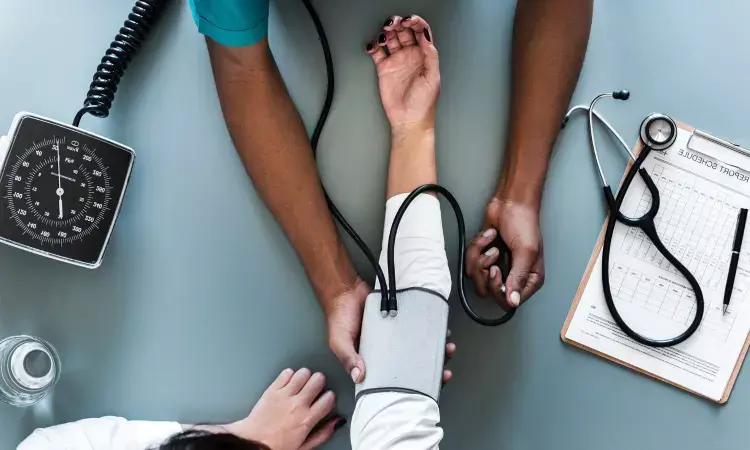- Home
- Medical news & Guidelines
- Anesthesiology
- Cardiology and CTVS
- Critical Care
- Dentistry
- Dermatology
- Diabetes and Endocrinology
- ENT
- Gastroenterology
- Medicine
- Nephrology
- Neurology
- Obstretics-Gynaecology
- Oncology
- Ophthalmology
- Orthopaedics
- Pediatrics-Neonatology
- Psychiatry
- Pulmonology
- Radiology
- Surgery
- Urology
- Laboratory Medicine
- Diet
- Nursing
- Paramedical
- Physiotherapy
- Health news
- Fact Check
- Bone Health Fact Check
- Brain Health Fact Check
- Cancer Related Fact Check
- Child Care Fact Check
- Dental and oral health fact check
- Diabetes and metabolic health fact check
- Diet and Nutrition Fact Check
- Eye and ENT Care Fact Check
- Fitness fact check
- Gut health fact check
- Heart health fact check
- Kidney health fact check
- Medical education fact check
- Men's health fact check
- Respiratory fact check
- Skin and hair care fact check
- Vaccine and Immunization fact check
- Women's health fact check
- AYUSH
- State News
- Andaman and Nicobar Islands
- Andhra Pradesh
- Arunachal Pradesh
- Assam
- Bihar
- Chandigarh
- Chattisgarh
- Dadra and Nagar Haveli
- Daman and Diu
- Delhi
- Goa
- Gujarat
- Haryana
- Himachal Pradesh
- Jammu & Kashmir
- Jharkhand
- Karnataka
- Kerala
- Ladakh
- Lakshadweep
- Madhya Pradesh
- Maharashtra
- Manipur
- Meghalaya
- Mizoram
- Nagaland
- Odisha
- Puducherry
- Punjab
- Rajasthan
- Sikkim
- Tamil Nadu
- Telangana
- Tripura
- Uttar Pradesh
- Uttrakhand
- West Bengal
- Medical Education
- Industry
Bioelectronic device to deliver pulsed electricity to body promising treatment for drug resistant BP: Study

Several medications are available to treat high blood pressure, but more than 10 million Americans do not respond to the treatments, according to the American Heart Association. Using a bioelectronic device to deliver pulsed electricity to the body has proven to be a promising strategy to treat drug-resistant hypertension patients, according to Penn State researcher Tao Zhou, although he noted that its practical application in patient care has significant limitations.
Zhou, assistant professor of engineering science and mechanics and of biomedical engineering, received a five-year, $1.83 million grant from the U.S. National Institutes of Health to develop a soft and stretchable tissue-like electronic device for the treatment of resistant high blood pressure.
In a Q&A with Penn State News, Zhou-who is a co-hire with the Huck Institutes of the Life Sciences and the Materials Research Institute as part of the Center for Neural Engineering-discussed the specifics of the grant.
Q: What are the limitations of existing non-medication-based strategies that treat high blood pressure?
Zhou: Existing devices have significant limitations that precludes their practical application. They are made of stiff materials and unable to stretch in response to the carotid artery wall's periodic expansion and contraction, which can cause tissue damage and inflammation. Devices also must be sutured to the carotid artery wall, which introduces further damage to the tissue on which they were implanted. Overall, these limitations can cause significant patient discomfort, illness and failure of devices over time.
Q: How does electrical stimulation of the neck reduce blood pressure in patients?
Zhou: Electrical stimulation of relevant nerves on the neck can activate the baroreflex, which can modulate patient blood pressure.
Q: What will be the key features of your device, and how will it benefit hypertension patients?
Zhou: We adopt soft and stretchable yet resilient hydrogel-based materials for the fabrication of the devices to better match the mechanical properties of tissues and to reduce tissue damage and inflammation after implantation. Owing to its intrinsic stretchability, the whole device can deform as the artery wall expands and contracts, thus minimizing constraint and damage to the carotid artery. We also will adopt a bioadhesive component in the proposed system to eliminate the need for suturing electrical devices on carotid artery walls, thus significantly decreasing the invasiveness of implanted devices and increasing the safety, stability and functionality of the device.
Dr Kamal Kant Kohli-MBBS, DTCD- a chest specialist with more than 30 years of practice and a flair for writing clinical articles, Dr Kamal Kant Kohli joined Medical Dialogues as a Chief Editor of Medical News. Besides writing articles, as an editor, he proofreads and verifies all the medical content published on Medical Dialogues including those coming from journals, studies,medical conferences,guidelines etc. Email: drkohli@medicaldialogues.in. Contact no. 011-43720751


